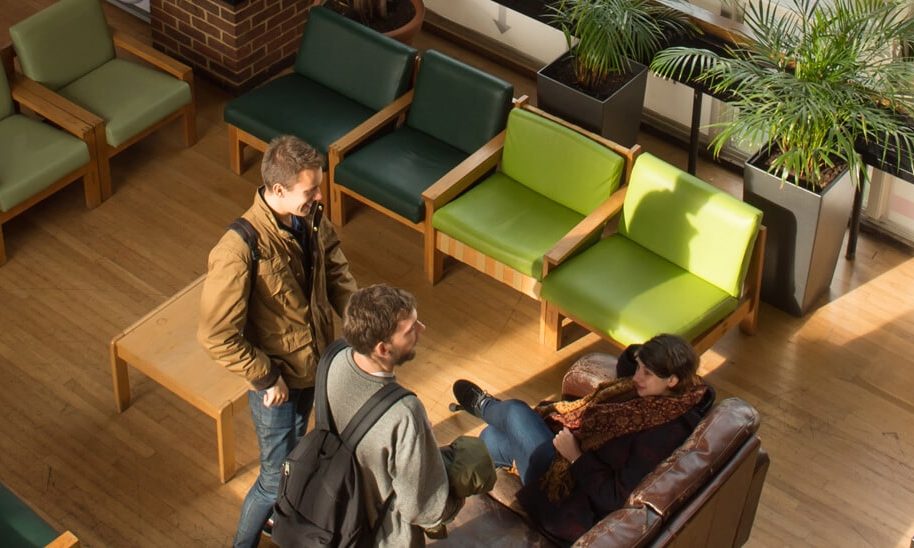
Dr Rona Hart
Course Director
School of Psychology
Talk to our Admissions Team
Enquire nowDive into the science behind kindness, discover its transformative effect on organisations, and learn practical strategies to enhance staff wellbeing.
 Delivered 100% online
Delivered 100% online  One of the first courses of its kind in the world
One of the first courses of its kind in the world  Start dates in January, March, May, July September and October
Start dates in January, March, May, July September and October  Course fee: £4,220 (£1,055 per module)
Course fee: £4,220 (£1,055 per module) Course start dates
There are six start dates every academic year, providing maximum flexibility for our students.
January | March | May | July | September | October
Fees
Course fee: £4,220
More information on fees, scholarships and funding can be found below.
Foster a positive workplace culture that’s built for success
At a time when it’s needed most, discover how to create better working environments and relationships across a wide range of industries. Become a catalyst for an organisational working culture that promotes kindness and enables employees to flourish and succeed. Delivered 100% online in as little as 8 months, this first of its kind PG Cert course evaluates the different approaches of kindness and wellbeing from an interdisciplinary and contemporary perspective.
You’ll learn from leading academics from both the renowned School of Psychology and the Business School, ranked 13th and joint 14th the UK respectively (Times Higher Education World University Rankings 2022). The course also draws on expertise from the Sussex Kindness Research network. Using real world case-studies including those of your peers and your own professional experiences, you’ll critically evaluate the origins of kindness and its links with wellbeing.
Upon completion of the course, you’ll be equipped to mitigate common workplace challenges that undermine staff wellbeing, such as occupational stress and toxic leadership, and will be inspired to create a better working environment for yourself and others.
Why did I choose the University of Sussex? I think because they offered a programme that was number one, part-time, and number two, online. And it was just easy to balance with my job and other commitments I have.
The faculty have been extremely accommodating given the way the course is structured on a very flexible basis. People are not necessarily flowing from one module automatically to the next.
What I’ve really felt on this online course is that the learning materials are such a high quality. They prepare, kind of, really consumable content for us on what we should be learning.
The course is flexible in the way it allows you to study. So, I have control of when I can do certain things. If, for example, at work I have lots of deadlines coming up, I could block out a module and then rejoin it in the next module.
A couple of the anxieties I had before I started the course was how does it all work? But it was all very simple. Within the first week, you go on there, it’s all very easy to use and navigate. Any questions I have had, I was able to ask the Student Success team and they get back to you very promptly.
The flexibility of having an app, having a website, having all the materials you need, just makes life a lot easier.
Different methods of learning definitely helped. I found that podcasts for me were really helpful to get the information in.
I found it great if I’m watching videos and lectures to be able to fast forward them, pause them, rewind them.
The reading list has actually been something that I’ve really enjoyed because I was a bit, kind of, worried about not having access to the library, but the reading list has been carefully, like, selected and it’s so easy to get onto the books and also for me it’s been great because you can download them as PDFs.
So, people connected really well. We did lots of sharing online and actually, we feel really connected so there’s lots of people that I met on the course that I’ll now stay in touch with.
I think it’s really great that the cohort is international for the online course. So I’ve made amazing professional connections with people working in Canada, Asia, all over Europe, as well as all over the UK.
I’d like to end up working in the field. I’m going to take my time now I’ve finished the course and again make sure I end up somewhere I really want to. I think the most important thing for me would be somewhere I feel like I’m actually making a difference for the future.
I did quite a lot of research into all the different courses that were available and I wanted an applied wellbeing course, so the fact that it was Wellbeing and Kindness at Work was really important to me. And online made it pretty much the first choice because it’s the only way I could fit it in with coaching, training, family, and everything else that we have to juggle.
I think it’s the course of the here and now because we all want to be able to take care of our wellbeing.
So the online experience has been great. It’s quite overwhelming at first getting to grips with all the different technology that you have to learn, but once you know it, it’s amazing because you can work, you know, use the tools while you’re at home. I can use the app while I’m on the move so you you can have these little snippets of, I guess, like, bite-size learning as it fits into your day.
So people connected really well. We did lots of sharing online, going across the group and sharing our personal experiences of kindness at work, and actually we feel really connected so there’s lots of people that I met on the course that I’ll now stay in touch with.
I think the best thing about the Psychology of Kindness course is that it makes you more aware of kindness. It raises your awareness for yourself, for other people and then those at work, and I think it just reminds us that actually we can all be a little bit kinder day to day.
Each module lasts seven weeks and is delivered via Canvas, a state-of-the-art online learning platform, which can be accessed by a computer, tablet or smartphone alike so you can truly study whenever and wherever you like. You can take control of your schedule by fitting the recommended 20 hours study time per week around your existing commitments and lifestyle.
In order to graduate the course, all of the modules listed below must be successfully completed.
The PG Cert can be completed in a minimum of 8 months or a maximum of 20 months if you choose to take a break from study.
The course uses multiple assessments methods to assess students’ knowledge, competence development and engagement through individual and groupwork exercises, such as written reports, simulations, essays, project reports, MCQs, and portfolios. An indication for the likely assessment methods of this module is given, though this may be subject to change.
A second-class (2.2) undergraduate honours degree or above from any UK university or international equivalent. You could also be considered for entry to this course with relevant professional experience and may be required to submit a portfolio of work as part of your application.
Applicants whose first language is not English (and whose first degree was not taught in English) need to supply evidence of IELTS (Academic) High level (6.5 overall, including at least 6.0 in each component).
Course fee: £4,220
Cost per module: £1,055
Flexibility is at the heart of our online courses: fees can be paid on a module-by-module basis, or as a single fee at the start of the course. You are required to pay the first module fee of £1,055 to secure your place on the course. You may also consider corporate sponsorship and employer funding. Our Admissions Team will be able to assist you with next steps.
Course fees will remain fixed for 24 months from your initial course start date. Thereafter, the course fee will rise at a rate of 2.5% per calendar year (subject to rounding for administration purposes).
If you have previously graduated from an undergraduate, postgraduate or PhD course with the University of Sussex you will be eligible* for a 20% discount on this online course.
Find out more about the alumni discount and eligibility criteria.
*T&Cs apply.
Please visit our Fees and Funding page for more information.
As a graduate of this course, you’ll have the skills and understanding to bring about positive change in the workplace. Using insights from real-world case studies and ground-breaking research from a range of disciplines, you can make an impact in a wide variety of roles and industries, on a local or global scale.
This course is for professionals working in roles directly responsible for staff wellbeing, such as public sector workers, or those looking to raise awareness of wellbeing to bring about organisational change, e.g. HR and training staff. Recent graduates from all disciplines seeking management roles will also find value in this PG Cert, alongside community leaders and volunteers working directly with members of the public.
Upon completion of the course, you’ll gain the confidence to critically review and assess your current workplace and its practices, leading change from within – asking questions and not just complying – and, ultimately, making your workplace a kinder place.
Make a real impact in your workplace
By choosing to study our online Psychology of Kindness and Wellbeing at Work PG Cert, you’ll develop the skills required to bring about real change regarding wellbeing and kindness, nurturing positive organisational cultures and making a genuine impact in the workplace. You will also:
* Times Higher Education World University Rankings by Subject 2022

Course Director
School of Psychology

Head of the School of Psychology
School of Psychology

Senior Lecturer
School of Psychology

Lecturer
School of Psychology

Visiting Lecturer
School of Psychology
“I missed the opportunity to complete a Masters in my previous career and had always hoped to do one, one day. I have a lot of commitments at home with family and running a business. This format suits both my lifestyle and my choice of subject.”
If you’d like to find out more about this course, please complete this form to receive information from our Admissions Team.

Learn more about the psychology of kindness and how you can drive a culture of kindness at work to enhance employee wellbeing and business performance.

Learn more about positive leadership in business and its transformative power on productivity, performance and staff retention.

Discover why wellbeing is important at work and explore five interventions that could help both employees and businesses reach their potential.